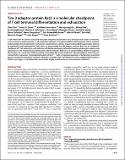Tim-3 adaptor protein Bat3 is a molecular checkpoint of T cell terminal differentiation and exhaustion
Author(s)
Zhu, Chen; Dixon, Karen O; Newcomer, Kathleen; Gu, Guangxiang; Xiao, Sheng; Zaghouani, Sarah; Schramm, Markus A; Wang, Chao; Zhang, Huiyuan; Goto, Kouichiro; Christian, Elena; Rangachari, Manu; Rosenblatt-Rosen, Orit; Okada, Hitoshi; Mak, Tak; Singer, Meromit; Regev, Aviv; Kuchroo, Vijay; ... Show more Show less
DownloadPublished version (36.13Mb)
Publisher with Creative Commons License
Publisher with Creative Commons License
Creative Commons Attribution
Terms of use
Metadata
Show full item recordAbstract
T cell exhaustion has been associated with poor prognosis in persistent viral infection and cancer. Conversely, in the context of autoimmunity, T cell exhaustion has been favorably correlated with long-term clinical outcome. Understanding the development of exhaustion in autoimmune settings may provide underlying principles that can be exploited to quell autoreactive T cells. Here, we demonstrate that the adaptor molecule Bat3 acts as a molecular checkpoint of T cell exhaustion, with deficiency of Bat3 promoting a profound exhaustion phenotype, suppressing autoreactive T cell-mediated neuroinflammation. Mechanistically, Bat3 acts as a critical mTORC2 inhibitor to suppress Akt function. As a result, Bat3 deficiency leads to increased Akt activity and FoxO1 phosphorylation, indirectly promoting Prdm1 expression. Transcriptional analysis of Bat3 -/- T cells revealed up-regulation of dysfunction-associated genes, concomitant with down-regulation of genes associated with T cell effector function, suggesting that absence of Bat3 can trigger T cell dysfunction even under highly proinflammatory autoimmune conditions.
Date issued
2021Department
Massachusetts Institute of Technology. Department of Biology; Koch Institute for Integrative Cancer Research at MIT; Ludwig Center for Molecular Oncology (Massachusetts Institute of Technology)Journal
Science Advances
Publisher
American Association for the Advancement of Science (AAAS)